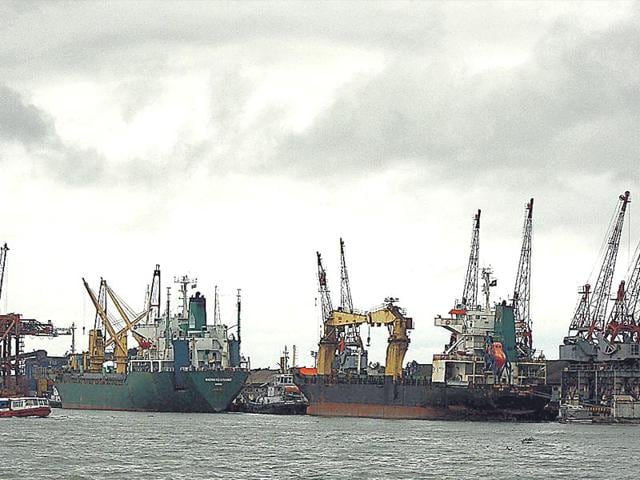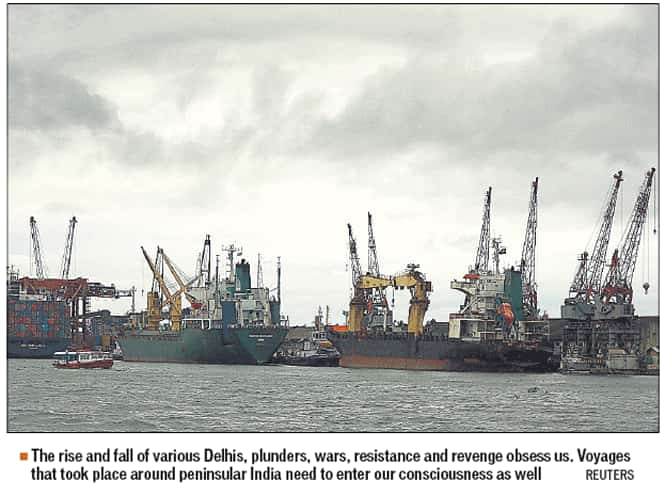Sailing on the seas of history
Meera Abraham offered a rare glimpse into the trading traditions of peninsular India and the link between South Indian and Roman merchants. Gopalkrishna Gandhi writes.
Some leave life’s harbour with a splash, some glide gently into the deep.

Meera Abraham, historian of Indian sea-faring merchant trade, crossed over to the Great Beyond from the coastal Kerala village of Kadapra last month, with the dignity of age and the repose of wisdom.
The New Delhi of momentous farewells, and the Mumbai, Chennai and Kolkata of headline departures, will not know the place that bade this woman of formidable intellect just the kind of farewell she would have liked: no fuss, no pomp, only very tender, very real affection.
The place was a niche in a niche of south India.

And Meera Abraham was herself a niche historian, the more valuable and rarer for being so. Her book Two Medieval Merchant Guilds of South India (Manohar, 1988) discusses a subject that, even among historians, would be regarded as heavily specialised, technical, almost. The theme of the two merchant guilds, Manigramam and Ayyavole, which flourished between the 9th and 14th centuries, cannot interest too many readers. The South Asia Institute of Heidelberg University, which sponsored the study, obviously found it more than interesting, but how many would want to deepen their ethnographic means to understanding the relations between South India and Roman traders in those times? Very, very few.
But then that is what real scholarship is about. The retrieval of meaning from evidence is a form of redeeming truth from legend, reality from myth-making. The shaping of India’s ethnic mosaic has been the playground of myths. With no predispositions, except to accuracy, Meera Abraham explored the control south India’s ancient towns and capital had over sea trade and tracked the link between Christianity and medieval commerce.
With the drive to work with and yet work better than China in trade in the region of our seas, Meera Abraham would have very likely been turned to for a historian’s perspective on political and cultural diplomacy in the wake of sea-borne trade, especially on our south-western and south-eastern seaboards. She would have welcomed a serious discussion on the subject but it is doubtful if she would have too readily obliged opportunistic, short-termist queries. Being a historian, she would have been impatient with anyone wanting tendentious history ‘inputs’. And being Meera Abraham, she would have politely but firmly discouraged tattle.
Married to the distinguished diplomat Thomas Abraham, who, at 87, is a walking encyclopedia of knowledge, she travelled to and lived in almost all the major capitals of the world, with both Moscow and Washington being of course high on that list but no less pertinently Singapore and Colombo. In these diplomatic postings, she did with finesse what was expected of a ‘Her Excellency’ but with her historian’s mind fully awake, absorbing all that was worth observing and analysing. She established quite simply by what she was — the salutary point that a spouse is not just a decoration in the Embassy, not a living object d’art, but a thought-sharer.
Those who had the privilege of serving under high commissioner Thomas Abraham in our high commission in Colombo (1978 to 1982) remember with pride the manner in which he stood up for the rights, privileges and self-respect of thousands of Indian citizens and prospective Indian citizens among Sri Lanka’s plantation workers. High commissioner Abraham’s sense of the history of Indian indenture, of the kangani system which brought these workers’ forbearers from the Tamil countryside when it was hit by drought, their struggles, including struggles for basic human rights and labour rights, was supplemented by Meera Abraham’s deep understanding of the cross-currents of South Asian history. Not just because India is India but because Thomas Abraham is what he is, the president and prime minister of Sri Lanka heard him whenever he wanted to be heard. They knew his razor-sharp awareness of the history of the region gave him a phenomenal grasp and equal credence to speak facts bluntly. And they knew Meera Abraham’s unobtrusive but highly informed awareness of the India-Lanka time-lines and story-lines was for him and for the Indian high commission an added asset. She would ask incisive questions about the larger India-Lankan picture, its whys and wherefores and, doing just that, show events to be more than ‘episodes’, rather, an inter-leaved ‘work in progress’.
One major perspectival correction some of us received from Meera Abraham was about the origins of the Sinhala population of Sri Lanka. Most assume that while the Tamils of Sri Lanka are, well, of Tamil origin, the Sinhalas have an east Indian, and, specifically, Bengali or Odishan descent and if there is any south Indian ‘touch’ in them, it is Keralite. In her soft voice that could contain hard truths, she explained that continental migrations are like voyages, not hopping or non-stop air flights. They are a slow process, with multiple streams, some dominant at one time, others at other times flowing into each other; no one is superior, anterior or ‘original’ and there is no such thing as ‘a pure race’.
To see Sri Lankan Tamil questions as, basically, a matter of Dravidian sentiment is as erroneous and dangerous as seeing Kashmir as a separatism issue. “From Kashmir to Kanyakumari” is a tedious cliché in Indian political discourse. It hides the truth that neither of those two ‘poles’ is really understood by the vast hinterland of India’s north and ‘centre’, the home-ground of its power-wielders.
“I do not know what is happening to our country,” Thomas Abraham said to me recently. “Everything about India now seems to be about North India … I wonder if Delhi has any sense of the India south of Nagpur.”
The rise and fall of various Delhis, plunders, wars, resistance and revenge obsess us. Voyages that took place around peninsular India need to enter our consciousness as well. Our south is not all about conquests, conversion and coercion. It has made us real ‘peoples’, rather than a mythic ‘race’.
And yet how many in the north will take the trouble to pronounce ‘Thiruvananthapuram’ right? Or say ‘Kerala’ as it should be said, and not by the Hindi for bitter gourd?
Gopalkrishna Gandhi is senior fellow, Centre for Public Affairs and Critical Theory, Shiv Nadar University
The views expressed by the author are personal





